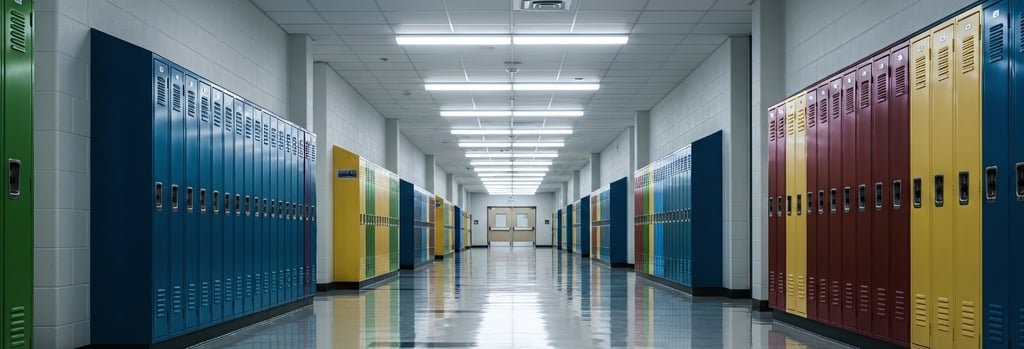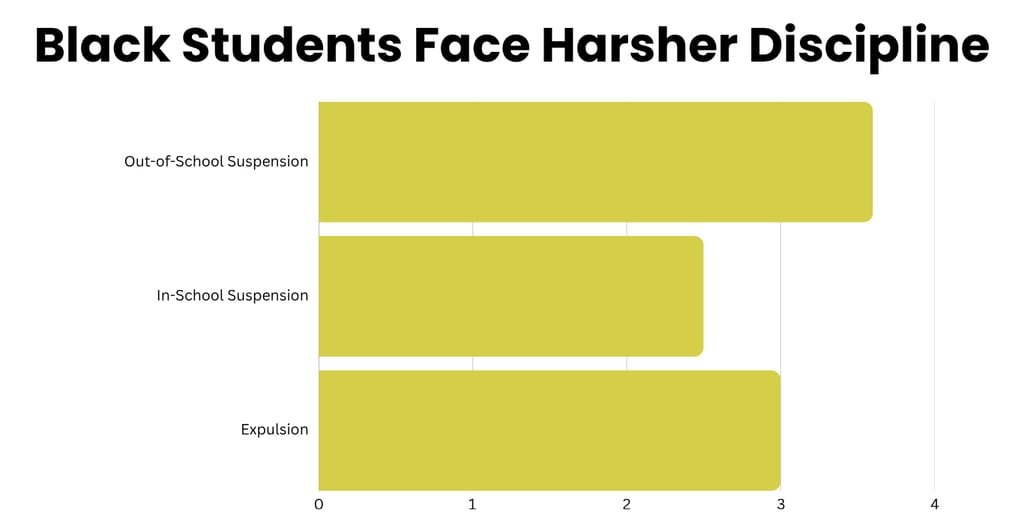School Advocacy 101: How to Fight for Your Kid Without Burning Out

Didn’t read Part 1? Start here.
This is a long, comprehensive guide (17-minute read).
Short on time?
• Jump to the Advocacy Toolkit for checklists you can use right now
• Bookmark this post. You’ll need it when school issues arise.
What You’ll Learn
If you only have 2 minutes, here’s what this post covers:
- When gifted programs help vs when they hurt (with research on both sides)
- Why discipline gaps exist and what the data actually shows
- Your exact legal rights as a parent (Title VI, IDEA, 504)
- Step-by-step advocacy toolkit with checklists you can actually use
- When to escalate and who to contact at each level
Bottom line: Your kid isn’t the problem. The system that fails to see them is. Here’s how to fight back strategically.
Jump to What You Need:
• When Gifted Programs Help (and When They Don’t)
• Understanding Discipline Disparities
• How to Advocate Strategically
• Your Complete Advocacy Toolkit
Most Used Section
• Legal Rights Quick Reference

Let’s Pick Up Where We Left Off
In Part 1, we talked about choosing schools. The guilt. The math that doesn’t add up. The truth that your presence beats any price tag.
Now let’s talk about what happens after you pick one.
Because here’s what they don’t tell you at enrollment: choosing the school is the easy part.
Making sure your kid actually thrives once they’re inside? That’s where it gets real.
You need to know when these programs help, when they hurt, and when to step in before things go sideways.
Let’s get into it.

Gifted Programs: The Best Thing or The Worst Thing (Depending)
Your kid tested into gifted.
Okay. Now what?
Before you panic or celebrate, let’s talk about what research actually says. The good. The bad. And how to tell which one your kid’s experiencing.
When Gifted Programs Are Actually Amazing
Let’s start here: gifted programs can be life-changing when they’re done right.
And by “right,” I mean programs that actually challenge kids without destroying them.
A 2023 study from the National Research Center on the Gifted and Talented breaks down what works:
Kids who are bored become problems. Gifted students stuck in regular curriculum often zone out, act out, or start hating school. Give them real intellectual challenge? They light up.
Finding your people matters. Other kids who think fast, ask deep questions, and don’t make you feel weird for caring about stuff? That’s huge. Social connection is half the benefit.
College readiness is real. Johns Hopkins Center for Talented Youth (2024) found that students in strong gifted programs show higher college completion rates and better prep for rigorous coursework.
Critical thinking skills transfer everywhere. When programs focus on creativity, problem-solving, and exploration, not just more homework, kids develop thinking skills that help them in every area of life.
So yes. Gifted programs can be transformative.
When they’re designed to challenge, not crush.
![Gifted programs can empower or overwhelm depending on structure."]](https://thethoughtfulnook.com/wp-content/uploads/2026/01/e6-IyhTK1jPyQmI2Rrp.jpg)
Quick Tip
Ask your school’s gifted coordinator: “How do you support students who struggle with perfectionism?” Their answer tells you if they understand the mental health side of giftedness.
When Gifted Programs Break Kids Instead of Building Them
But here’s where it gets messy.
That same National Association for Gifted Children study (2022) that shows benefits also found something else: gifted students have significantly higher rates of anxiety and depression than their peers.
Why?
Because we built these programs wrong.
When gifted programs emphasize:
- Competition over collaboration
- Perfect grades over growth
- Test scores over creativity
- Achievement over literally everything else
They create what Dr. Sylvia Rimm calls “anxious perfectionists who are terrified of making mistakes.”
That’s not gifted education. That’s trauma with a participation trophy.
The program itself isn’t the problem. How we run it? That’s the problem.

What the Research Shows About Long-Term Outcomes
Vanderbilt University (2023) followed gifted program kids for 30+ years.
Here’s what they found:
Career-wise? They crushed it. Higher degrees. Higher salaries. More patents, publications, leadership roles.
Happiness-wise? Mixed bag.
Some thrived. Others reported serious burnout, perfectionism that paralyzed them, and work-life balance that didn’t exist.
The difference?
Programs that celebrated exploration, effort, and creativity? Those kids ended up successful AND happy.
Programs that obsessed over rankings, competition, and flawless performance? Those kids ended up successful and miserable.
The structure of the program mattered more than being in the program at all.
Let that marinate.
The support mattered more than the label. Remember that when you’re deciding whether gifted is right for your kid.
The Access Gap: Who Gets Called “Gifted” and Who Doesn’t
Here’s the part that’ll make you mad.
U.S. Department of Education (2021): Black students are 15 percent of public school enrollment. But only 9 percent of gifted programs.
Latino students? Same story.
Now, before anyone says “maybe they just don’t test as well”, stop.
Vanderbilt’s Peabody College (2023) found that when schools use multiple ways to identify giftedness, not just one test, and actually look for it across all student populations, the gap shrinks dramatically.
Translation: The kids are gifted. We’re just not recognizing them.

Why This Happens
Teachers spot “giftedness” faster in students who:
- Raise their hands a lot
- Turn in neat homework on time
- Speak standard English
- Have parents who know how to navigate the system
Meanwhile, equally gifted kids who:
- Think before they speak
- Have chaotic home lives affecting homework
- Speak multiple languages or dialects
- Have parents who don’t know what to ask for
They get missed.
That’s not a talent problem. That’s a bias problem.
Quick Tip
Ask your school: “What percentage of students by race are in your gifted program?” Then compare it to overall enrollment. The gap tells you everything about their identification process.
Need Help Evaluating Your Child’s Gifted Program?
Download our Gifted Program Assessment Worksheet – Use it to determine if the program is helping or hurting.
![Assessment tool for gifted program evaluation."]](https://thethoughtfulnook.com/wp-content/uploads/2026/01/9-Q1pnsH5EOEmrxAWk.jpg)
So Should Your Kid Be in Gifted Programs? The Questions That Actually Matter
Here’s what you need to evaluate:
Question 1: Does the program focus on growth or perfection?
Good programs celebrate trying hard things and learning from mistakes.
Bad programs obsess over grades, class rank, and never being wrong.
Question 2: Is your kid energized or stressed?
Challenge should feel exciting, not suffocating.
Panic attacks over a B in third grade? Something’s broken.
Question 3: Are they finding their people?
If gifted class feels just as isolating as regular class, what’s the point?
Social connection is half the benefit. If that’s not happening, the program’s not working.
Question 4: Who’s actually getting in?
Look at the demographics. If it’s overwhelmingly one race or income level, the system’s probably biased.
Question 5: Does the school care about the whole kid?
Mental health support, social-emotional learning, and counseling should be part of any gifted program.
If it’s just “work harder, achieve more,” that’s not enough.
When to Pull Them Out (Yes, Really)
If gifted programming is causing:
- Chronic anxiety or depression
- Physical symptoms before school (stomachaches, headaches)
- Loss of joy in learning
- Perfectionism so bad they won’t try new things
- An identity crisis over not being “the best”
Pull them out.
No label is worth your kid’s mental health.
And here’s what matters: Stanford University research (2024) found no significant difference in college success between kids who stayed in gifted programs and kids who left but had strong support at home.
The support mattered more than the label.
Read that again. Print it out. Tape it to your fridge.
Your kid’s worth isn’t tied to a gifted program. Their success isn’t either.

Where Bias Hides in Plain Sight
Subjective violations. That’s where it all falls apart.
“Disruption.” “Defiance.” “Disrespect.” “Attitude.”
Vague violations that depend entirely on teacher interpretation.
And research shows that the same behavior is read differently depending on who’s doing it.
A white kid questions the teacher? “Critical thinker. Future leader.”
A black kid questions the teacher? “Defiant. Needs consequences.”
Same action. Different label. Different life.
How Microaggressions Compound Over Time
“Your daughter is so articulate!” (Translation: I didn’t expect intelligence.)
“Can you not wear your hair like that? It’s distracting.” (Translation: Your natural self makes me uncomfortable.)
Names mispronounced for months. No effort to learn them.
Asked to speak for your entire race in class discussions.
These aren’t small things. They’re daily messages that say, “edit yourself to be acceptable here.”
And they add up. Over years. Into how kids see themselves.
Your kid isn’t the problem. The system failing to see them fairly? That’s the problem.

The Discipline Gap: When the System Breaks Before It Even Teaches
Now let’s talk about when advocacy isn’t a choice. It’s survival.
The Numbers Don’t Lie Even When Schools Do
U.S. Department of Education (2021):
Black students are suspended at nearly four times the rate of white students.
For the same behaviors.
Black girls? Six times the rate of white girls.
Not because Black kids misbehave more.
Brookings Institution (2022) controlled for actual behavior. The gap stayed.
The problem isn’t what kids do. It’s how we see what they do.

Quick Tip
If your child is disciplined, ask in writing: “What would the consequence be if a white student did the exact same thing?” Watch how they respond. Document it.
Experiencing Unfair Discipline?
Jump to the Advocacy Toolkit for step-by-step actions you can take right now.
Still reading? You’re doing great.
You’re already halfway through. The advocacy toolkit with actionable checklists is coming up next—that’s the section you’ll reference most when real issues arise.
Bookmark this page now so you can find it when you need it.

How to Actually Advocate (Without Losing Your Job or Your Mind)
Here’s what you do when things go wrong.
The Foundation: Document Everything
Document like your kid’s future depends on it because it does.
Folder. Dates. Times. Names. Your kid’s version. Emails sent. Emails ignored.
Patterns matter. Memory doesn’t.
Start Strategic: Build Alliances Before You Need Them
Try this with teachers first: “I’d like to understand what happened. Can we talk? I want us on the same page.”
That’s collaboration.
Two attempts. If it’s not working?
Stop being polite. Escalate.
Know Your Power: Legal Rights Schools Hope You Don’t Know
Title VI prohibits racial discrimination in federally funded schools.
IDEA and Section 504 guarantee services for kids with disabilities.
Your kid disciplined differently because of race? Title VI violation.
IEP not being followed? Legal violation.
You can:
- Request meetings
- Bring advocates
- File complaints
- Contact Office for Civil Rights
Schools bank on you not knowing this.
Now you know.

Build Their Skills: Teach Self-Advocacy Early
Role-play at home:
“If they mispronounce your name: ‘It’s actually said this way.'”
“If you’re accused of something you didn’t do: ‘Can I explain what actually happened?'”
“If you don’t understand: ‘Can you explain that differently?'”
Self-advocacy is the skill that never expires.
Find Your Tribe: You Can’t Do This Alone
One parent? Easy to ignore.
Five parents at a school board meeting? That’s pressure.
Black Lives Matter at School has toolkits for organizing.
Community creates leverage. Use it.

Your Parent Advocacy Toolkit: When Something’s Wrong at School
⭐ This is the section most parents bookmark and return to.
You know something’s off. Your gut’s telling you. Now here’s exactly what to do about it.
Print this. Save it. Use it when you need to advocate.

BEFORE YOU ACT: Document Everything
Start Your Advocacy File:
☐ Create a physical or digital folder labeled with your child’s name and school year
☐ Note dates, times, and names every time something happens
☐ Write down your child’s version of events the same day they tell you
☐ Save all emails to and from teachers, admin, counselors
☐ Note when you don’t get responses (that matters too)
☐ Keep copies of report cards, progress reports, and discipline notices
☐ Screenshot or save any relevant text messages
☐ If other parents witnessed something, note their names and contact info
Why this matters: Memory doesn’t hold up in meetings. Documentation does. Patterns prove your point.
PREPARING FOR MEETINGS: What to Bring
Your Meeting Prep Checklist:
☐ Your documentation folder (physical or on your device)
☐ Written list of specific concerns (not vague feelings, actual incidents)
☐ Written list of questions you want answered
☐ Notebook and pen to take notes during the meeting
☐ Your child’s IEP or 504 plan, if they have one
☐ Copies of any relevant emails or reports
☐ A trusted friend, advocate, or family member if you want backup (you’re allowed)
☐ Your phone to record (if your state allows one-party consent recording, otherwise take detailed notes)
What to wear: Whatever makes you feel confident. This isn’t about impressing them. It’s about being taken seriously.
What NOT to bring: Anger that explodes. Bring controlled fire, not a wildfire. Stay strategic.

DURING THE MEETING: What to Ask and Do
Opening the Conversation:
☐ State your concern clearly and specifically: “I’m here because [specific issue]. I want to understand what’s happening and work together on a solution.”
☐ Ask them to explain their perspective first
☐ Take notes on everything they say (dates, quotes, next steps)
☐ Ask clarifying questions: “Can you give me a specific example?” “What’s the policy on this?”
Questions to Ask (Depending on the Issue):
For Discipline Issues: ☐ What exactly did my child do? ☐ What’s the standard consequence for this behavior? ☐ Have other students done the same thing? What happened to them? ☐ Can I see the discipline policy in writing? ☐ What data do you track on discipline by race/ethnicity?
For Academic Concerns: ☐ What specific support is available? ☐ What does the data show about my child’s performance? ☐ Can we create a plan with clear, measurable goals? ☐ What’s the timeline for reassessing? ☐ Who else should be part of this conversation?
For Gifted Program Access: ☐ What are the exact criteria for admission? ☐ How did my child score on those measures? ☐ If they didn’t qualify, what specific skills need development? ☐ Can we reassess in [timeframe]? ☐ What percentage of students of different races are in the program?
For IEP/504 Issues: ☐ Is my child’s plan being followed as written? ☐ If not, why not? ☐ What accommodations are currently in place? ☐ Can I observe my child in class to see the implementation? ☐ Can we schedule an IEP meeting to revise the plan?
Before You Leave: ☐ Summarize what was agreed upon: “So to confirm, you’re going to [action] by [date], correct?” ☐ Ask when you should follow up: “When should I check back in with you?” ☐ Request written confirmation: “Can you send me an email summarizing what we discussed?”

AFTER THE MEETING: Follow-Up Steps
Within 24 Hours:
☐ Send a follow-up email summarizing what was discussed and agreed upon
☐ Include specific action items and deadlines you discussed
☐ Thank them for their time (even if you’re frustrated)
☐ Keep a copy of that email in your advocacy folder
Sample email: “Thank you for meeting with me on [date] to discuss [issue]. To confirm, we agreed that [action] will happen by [date], and I will follow up on [date] to check progress. Please let me know if I’ve misunderstood anything. I appreciate your partnership in supporting [child’s name].”
If They Agreed to Take Action:
☐ Mark your calendar with the deadline they gave you
☐ Follow up on that date if you haven’t heard back
☐ Document whether the action happened and if it resolved the issue
If Nothing Changes:
☐ Send one more email: “I followed up on [date] about [issue]. I haven’t seen [agreed action]. Can we schedule another meeting?”
☐ If you don’t get a response or meaningful action within one week, escalate to the next level
WHEN TO ESCALATE: The Chain of Command
Start Here: Teacher (Give them 2 documented attempts to address your concern)
Then Go Here: Principal ☐ Request a formal meeting ☐ Bring all documentation ☐ Clearly state: “I’ve tried to resolve this with [teacher] on [dates], but [issue] continues.”
Then Go Here: District Superintendent ☐ Write a formal letter or email ☐ CC the principal and school board if appropriate ☐ Include a timeline of what you’ve tried and when
Then Go Here: School Board Meeting ☐ Sign up for public comment (usually 3 minutes) ☐ State the facts calmly ☐ Bring other parents if they’ve experienced similar issues.
If It’s a Legal Issue (Discrimination, Denied Services): ☐ Contact ACLU: aclu.org/know-your-rights/students-rights ☐ Contact NAACP Legal Defense Fund: naacpldf.org ☐ File a complaint with your state’s Office for Civil Rights ☐ Consult a lawyer (many offer free initial consultations)
Don’t skip steps unless there’s immediate physical or emotional harm. But don’t get stuck on a step that’s clearly not working.
Your Parent Advocacy Toolkit: When Something’s Wrong at School
⭐ This is the section most parents bookmark and return to.
You know something’s off. Your gut’s telling you. Now here’s exactly what to do about it.
Print this. Save it. Use it when you need to advocate.

YOUR LEGAL RIGHTS: Quick Reference
You Have the Right To:
☐ Request meetings with teachers and administrators
☐ Bring an advocate, friend, or lawyer to any meeting
☐ Request and receive copies of your child’s education records within 45 days
☐ Request evaluations for special education services
☐ Disagree with evaluation results and request independent evaluations
☐ Participate in all decisions about your child’s special education services
☐ File complaints with your state education agency
☐ File complaints with the Office for Civil Rights if discrimination occurs
Your Child Has the Right To:
☐ A free appropriate public education (FAPE)
☐ Education in the least restrictive environment
☐ Be free from discrimination based on race, color, national origin, sex, disability, or religion
☐ Due process before being suspended or expelled for more than 10 days
☐ Access to the same educational opportunities as other students
Key Laws to Know:
Title VI: Prohibits discrimination based on race, color, or national origin in federally funded programs (includes public schools)
IDEA: Ensures students with disabilities receive special education and related services
Section 504: Prohibits discrimination against students with disabilities and requires accommodations
Title IX: Prohibits sex-based discrimination in education
If your child’s rights are being violated, you can take legal action. Schools are required to follow these laws.

RED FLAGS THAT MEAN ACT IMMEDIATELY
Don’t wait. Don’t give extra chances. Act now if:
☐ Your child is experiencing physical harm or threats
☐ Your child suddenly refuses to go to school (when they used to like it)
☐ Your child is being disciplined repeatedly for things other students aren’t disciplined for
☐ Teachers refuse to respond to your emails after multiple attempts
☐ Your child’s IEP or 504 plan isn’t being followed at all
☐ You’re being told your child “doesn’t belong” at the school or should “find a better fit.”
☐ Your child is showing signs of depression, anxiety, or self-harm related to school
☐ Bullying is happening, and the school is doing nothing
These situations require immediate escalation, possibly skipping steps in the chain of command.
![Urgent red flags requiring immediate advocacy action."]](https://thethoughtfulnook.com/wp-content/uploads/2026/01/19-QxQTLC8ocbGaIVkv.jpg)
TRUST YOUR GUT
After meetings and actions, ask yourself:
☐ Do I feel heard, or was I dismissed?
☐ Did they take my concerns seriously, or minimize them?
☐ Did they provide specific action steps or vague promises?
☐ Did they follow through on what they said they’d do?
☐ Is my child’s situation improving, staying the same, or getting worse?
If your gut says something’s still wrong, keep pushing. You’re not being difficult. You’re being a parent.
Download: Parent Advocacy Toolkit (PDF). Keep it handy or share with friends.
Print it. Save it to your phone. Keep it in your glove compartment. You never know when you’ll need it.

Found the Toolkit Helpful?
Share it with another parent. Someone in your circle is dealing with school issues right now and doesn’t know where to start.
The Questions You’re Too Scared to Ask
What if I make it worse?
Silence usually costs more. Document everything. Stay factual. Bring witnesses.
The fear is real. But inaction when your kid’s being harmed? That costs more.
What if they call me difficult?
Let them.
You’re not here to be liked. You’re here to protect your kid.
“Difficult” parents are often the reason policies change. Be that parent.
What if I can’t afford a lawyer?
Most advocacy doesn’t need one. ACLU templates, PTA resources, legal aid orgs. Start there.
Many lawyers offer free consultations. Some take education cases pro bono.

When to Let It Go (Because Not Every Battle Matters)
Not every issue requires escalation, but this is solely up to you.
Let natural consequences handle:
- Forgot homework? That’s on them.
- Didn’t make the team? That’s disappointment, not injustice.
- Got a B? Unless there’s grading bias, that’s life.
Save your energy for what actually matters:
- Safety issues
- Discrimination and bias
- Denied services they’re legally entitled to
- Patterns of unfair treatment
Know the difference between advocacy and helicoptering.
One protects. One suffocates.
Your kid isn’t the problem. Remember that when deciding which battles to fight.

Bringing It All Together: Choice + Advocacy = Your Kid’s Best Shot
In Part 1, you learned how to navigate the impossible choice between public, private, and charter schools.
You learned about funding gaps, the diversity problem in private schools, the inconsistency of charters, and the parent guilt that keeps you up at night.
Most importantly, you learned this: your presence matters more than the price tag.
Now, in Part 2, you’ve learned how to advocate within whatever system you chose.
How to evaluate if gifted programs help or hurt. How to spot bias in discipline. How to document, escalate, and fight strategically without burning out.
Here’s what you have now:
- The knowledge to choose the right school
- The tools to advocate within that school
- The legal rights to back you up when systems fail
- The community resources to keep you from doing this alone
That’s the full picture. Choice + advocacy.
Not just picking a school and hoping for the best.
But picking a school AND knowing exactly how to make sure your kid thrives there.
The support matters more than the label, whether it’s a gifted program, a school type, or any other decision.
What matters is YOU showing up. Documenting. Asking hard questions. Refusing to accept “that’s just how it is.”
Your presence is the advantage no tuition can buy. Your voice is the protection no handbook provides.
![Complete advocacy journey from choice to action."]](https://thethoughtfulnook.com/wp-content/uploads/2026/01/chatgpt-image-nov-2-2025-11_55_24-am-gCmZJ1M8qVDaeJAp.jpg)
One Last Thing
Your kid isn’t the problem.
Say it again: Your kid isn’t the problem.
The system that refuses to see them? That’s the problem.
The program that crushes instead of challenges? That’s the problem.
The discipline policy that treats kids differently based on skin color? That’s the problem.
Don’t let any teacher, principal, or administrator convince you otherwise.
You know your kid.
Trust that.
Now go advocate.
Not because you want a fight.
But because your kid deserves to be seen.
And sometimes being seen requires someone who refuses to look away.
That someone is you.

What You Can Do Right Now
If this post helped you:
☑ Bookmark it. You’ll need to come back to the toolkit when issues arise.
☑ Download the advocacy checklist. Print it. Keep it in your glove compartment or bag.
☑ Share it with another parent. Someone in your circle is struggling with this right now. Forward them this link.
☑ Follow The Thoughtful Nook for more real talk on parenting, education, and navigating systems that weren’t built for us.
☑ Join our email community. Get more topics that speak to you delivered to your inbox.
☑ Tell us your story. Tag us @the_thoughtfulnook on Instagram, @the.thoughtful.no on TikTok, and share which advocacy tip you’re using first. Your experience might be exactly what another parent needs to hear.

Further Reading
• U.S. Department of Education: Civil Rights Data Collection • Brookings Institution: Education Equity Research • National Association for Gifted Children: Research Library • American Civil Liberties Union: Students’ Rights • NAACP Legal Defense Fund: Education Justice

Resources Worth Saving
Gifted Education: • National Association for Gifted Children: nagc.org • Davidson Institute: davidsongifted.org
• Johns Hopkins Center for Talented Youth: cty.jhu.edu
School Advocacy: • National Parent Teacher Association: pta.org • Understood.org: understood.org
Civil Rights & Legal Support: • ACLU Students’ Rights: aclu.org/know-your-rights/students-rights • NAACP Legal Defense Fund: naacpldf.org • Black Lives Matter at School: blacklivesmatteratschool.com
If you’re outside the U.S., search for local parent advocacy groups and education rights organizations in your region.
Your presence is the advantage no tuition can buy. Your voice is the protection no handbook provides.
Now breathe. You’ve got this.

Written with honesty and care from The Thoughtful Nook, where we make space for the conversations that matter.



